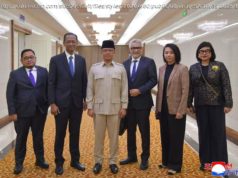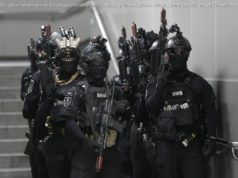Experts say North Korea may demand concessions from the South Koreans for talks and that could trigger stress in the Seoul-Washington relationship.
A possible thaw in relations between the two Koreas might bring them to hold rare talks but is unlikely to end the nuclear threat from Pyongyang, according to experts.
It could, however, ease tensions during the upcoming PyeongChang Winter Olympics in South Korea and reduce the chance of an escalation that might lead to a larger crisis, analysts said.
In a New Year’s Day speech, North Korean leader Kim Jong Un said he was „open to dialogue“ with Seoul and indicated that the North might send a „delegation“ to the upcoming Winter Olympics, which begin Feb. 9.
On Tuesday, the Seoul government proposed talks could be held in the inter-Korean truce village of Panmunjom on Jan. 9, according to the Yonhap News Agency .
„We should take it seriously partly because he [Kim] is trying to drive a wedge between the United States and South Korea,“ said Matthew Bunn, a nuclear proliferation expert and professor of practice at Harvard University’s John F. Kennedy School of Government.
Some experts believe the outreach from Pyongyang is ultimately an attempt to cause friction in the Seoul-Washington relationship and undermine sanctions, as well as to disrupt plans for the upcoming Foal Eagle and Key Resolve U. S.-South Korea joint military exercises.
The war games, which North Korea has seen over the years as a war rehearsal, involve navy ships, tanks and aircraft as well as live-fire exercises and tens of thousands of troops. They are scheduled to start in March.
„What he’s saying, in essence, is something some of us have been expecting for a while: ‚I’ve got my deterrent now, so now I am prepared to talk,'“ said Bunn, who worked on nuclear issues in the Bill Clinton administration.
Meantime, analysts say Kim’s message to Washington about having the „nuclear button“ on his desk should be viewed as a sign the regime won’t give up its intercontinental ballistic missiles or nuclear weapons. Some believe Kim, who turns 34 years old next week, could have assembly lines going for his new ICBMs this year.
„Several times in his speech he emphasized the fact that they are a strong nation because of nuclear weapons,“ said Lisa Collins, a fellow with the Korea Chair at the Center for Strategic and International Studies, a defense think tank. She said the reference to the „nuclear button“ shouldn’t be viewed as a threat, but „he’s making very clear again that he will not be giving up his nuclear weapons.“
Last year, North Korea test-launched at least three ICBM missiles, including a Hwasong-15 in late November that some experts believe can reach all of the U. S. mainland. Also, the rogue nation conducted its sixth underground nuclear test in September and threatened to do an atmospheric nuclear blast but so far hasn’t done so.
On Tuesday, NBC News Pentagon correspondent Hans Nichols reported that another missile launch by Pyongyang „is possible, if not likely, in the coming days,“ citing several military officials.
Collins said the data they’ve collected at CSIS shows that there’s „usually a downtick in missile testing in the winter months — November, December and January — and then usually in the early spring and summer is when there’s an increase in North Korean missile tests. So I would anticipate the same pattern happening again this year in 2018 if there is no fundamental strategic change in the environment.“
The Pentagon declined to comment.
Analysts say the fact Kim delivered the New Year’s message in a Western-style suit rather than his usual Maoist attire may be an attempt to „humanize him,“ especially to U. S. and Asian audiences. However, one U. S. expert believes that effort was a complete failure.
„Unfortunately, he came off looking more like a gangster than he did a sort of normal Westernized businessman or presidential leader,“ said Harry Kazianis, director of defense studies at the Center for the National Interest, a think tank founded by former President Richard Nixon.
Regardless, Bunn said Kim probably wants to talk first with the South Koreans because „he sees a more cooperative leader“ in Seoul than in Washington. He also believes „it’s an opportunity to reduce tensions on the peninsula, which were getting to the point where there was a real risk of inadvertently blundering into war.“
In response to Monday’s olive branch from Kim, South Korea’s president, Moon Jae-in, said he welcomed the news and possibility to turn the „games into a groundbreaking chance to improve South-North relations and establish peace.“
At the same time, South Korea’s prime minister, Lee Nak-yon, was quoted as saying North Korea might now demand „different treatment“ in discussions, Yonhap reported.
„Lee didn’t elaborate on what ‚different treatment‘ may mean, but it apparently indicates that the communist nation could demand the South treat it as a nuclear weapons-armed state,“ the South Korean news agency reported.
Talks could involve a North Korean team participating in the upcoming PyeongChang Winter Olympic Games, which will be held about 50 miles from the border that divides the two Koreas.
„My question is what do the North Koreans want,“ said Kazianis. „Every time North Korea comes to the table, they always want something for it.“
One possibility is that North Korea may want the U. S. and South Korea to weaken sanctions, although that’s unlikely to get any support from the Trump administration.
Indeed, President Donald Trump on Tuesday morning tweeted: „Sanctions and ‚other‘ pressures are beginning to have a big impact on North Korea.“
United Nations Security Council sanctions against North Korea are wide-ranging on trade and limit exports on such things as textiles, seafood and coal but also cut back oil and gasoline imports. Even so, Reuters last week reported that there have been at least three cases of Russian tankers in recent months transferring oil at sea for North Korea.
Kazianis said the South Koreans are „in a bind with the Olympics. The North Koreans have a lot of ways to make the Olympics go very bad.“
„So, I think Kim Jong Un probably realizes this and probably will go to the South Koreans on Jan.
Start
United States
USA — Korea Possible Korean talks are a good start but unlikely to end nuclear...






